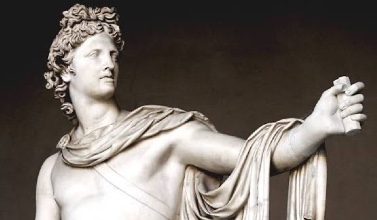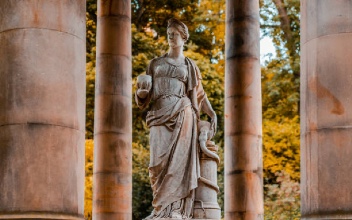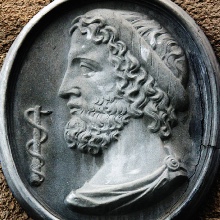
Long ago, even before the time of Hippocrates, who laid the foundations of the modern practice of medicine in Classical Greece, healing and medicine were deeply rooted in the legends and myths of ancient times. Greek mythology wasn't merely spinning tales around gods and monsters: it offered a symbolic and spiritual vocabulary to describe illness, healing, and the body. In fact, most of our understanding of medicine, healing, and the relationship between a physician and a patient has its earliest origins in these ancient stories.
Asclepius: The Healing God
At the center of Greek medical mythology stands Asclepius, the god of medicine and healing. A demi-god, he was the offspring of the god of plague, music, and prophecy, the god Apollo, and a mortal, Coronis. Asclepius was born to excel. Traditionally schooled in the healing art by the sage centaur Chiron, who also taught heroes like Achilles and Jason, too.
Asclepius's healing powers were so immense that he could resurrect the dead—a task which would eventually contribute to his death. Fearing Asclepius would upset the balance of life and death, Zeus struck him dead with a lightning bolt. Despite this, his reputation lived on, and he was named the god of medicine and temples to him were erected in his honor throughout Greece. The temples were not only centers of spiritual rituals, but they were a form of proto-hospitals. Pilgrims went to them seeking cures through a method of incubation, where they slept at the temple in the expectation of being given a healing dream or vision by Asclepius. The priests interpreted the dreams, sometimes even having learned the basics of medicine, and would administer treatments ranging from herbal medicine to minor surgery.
Chiron: The Centaur Who Heals
Though centaurs were generally represented as being cruel and feral, Chiron stood apart. Chiron was a gentle and wise centaur who was a master at healing, a holistic and empathic art of medicine. With herbs, surgery, and a deep understanding of nature, he cured wounds and illness, and he instructed his art to groups of mythical heroes.
Chiron's life in Greek legend reflects the idea that medical knowledge has to be acquired and has to be earned, tied both to nature and to discipline. It was a balance between the mystical and the practical, the same balance that the practice of medicine represents.
Apollo: Dual Role as Healer and Harbinger of Plague
Asclepius’s father Apollo held a complex relationship with health. While he was known as a god of healing and the father of medicine, he could also bring about plagues and diseases with a stroke of his silver bow. This duality reveals how the Greeks understood illness: as both a divine punishment and a natural affliction that could be cured through ritual, prayer, and medical intervention.
Apollo's association with both harm and healing reflects an intuition about the potential of nature and the gods—both dangerous and salvific. This double role would lead to the authority physicians would hold in Greek society, mediators between human illness and divine curing.
Panacea and Hygieia: The Daughters of Medicine
There are two lesser-known but significant Greek medical gods, daughters of Asclepius: Panacea and Hygieia. Their names live today in modern vocabulary: panacea represents a cure-all, and hygiene represents cleanliness and health.
Panacea symbolized the universal medicine, an emblem of the hope of a single remedy to heal all diseases.
Hygieia embodied preventative medicine; cleanliness, sanitation, and daily habits that keep illness at bay.
Together, they represent a complementary model of health: healing and prevention, short-term relief and ongoing wellness. It's similar to the models of healthcare today, which emphasize treatment and prevention.
Legacy
The ancient Greek myths of medicine has helped to form the Greeks', the Romans', and the contemporary Western world's understanding of what constitutes health. The Hippocratic Oath, utilized today in modernized form by many physicians, calls on Asclepius and his daughters to be the divine sponsors of the physician's sworn oath. To date, the Rod of Asclepius, a snake wrapped once around a staff, remains an international sign of medicine and healing utilized by entities like the World Health Organization and national healthcare associations internationally.



Other Posts
 Cervical Cancer Awareness Month: Prevention and Early Detection
Cervical Cancer Awareness Month: Prevention and Early Detection
 The Hollywood Smile: A Detailed Step-by-Step Guide
The Hollywood Smile: A Detailed Step-by-Step Guide
 Hollywood Smile: Transform Your Smile
Hollywood Smile: Transform Your Smile
 Thigh Lift Surgery (Thighplasty): Sculpt Firmer Thighs
Thigh Lift Surgery (Thighplasty): Sculpt Firmer Thighs
 Tummy Tuck (Abdominoplasty)
Tummy Tuck (Abdominoplasty)
 Body Contouring: Reshape Your Body, Restore Your Confidence
Body Contouring: Reshape Your Body, Restore Your Confidence
 Planning Your Health in Advance: Medical Checklists for the New Year
Planning Your Health in Advance: Medical Checklists for the New Year
 New Year 2026: Start the Year Healthier and Happier
New Year 2026: Start the Year Healthier and Happier
 Dermal Fillers: Restore Your Youth
Dermal Fillers: Restore Your Youth
 Septoplasty: Breathe Freely Again
Septoplasty: Breathe Freely Again








